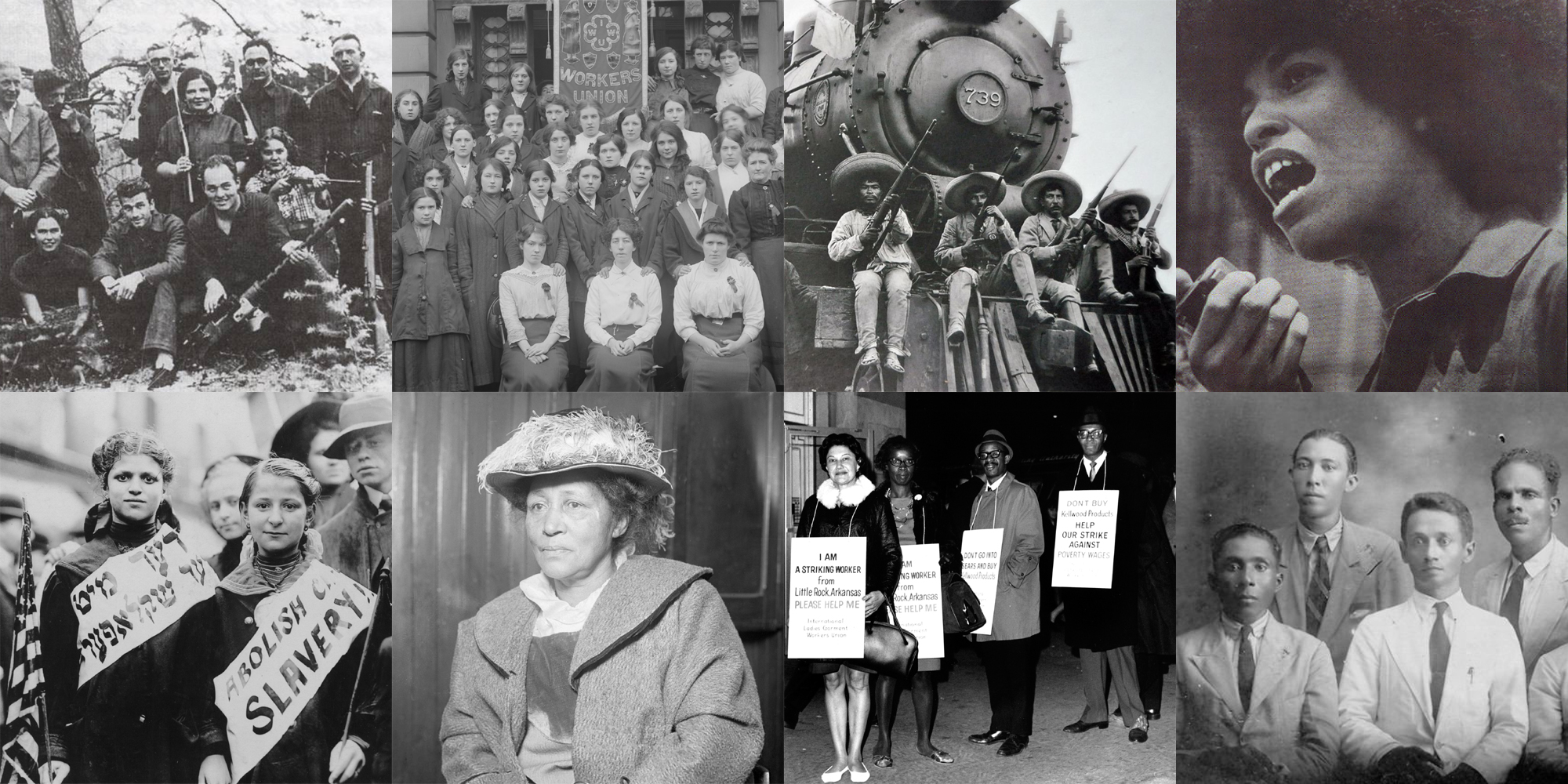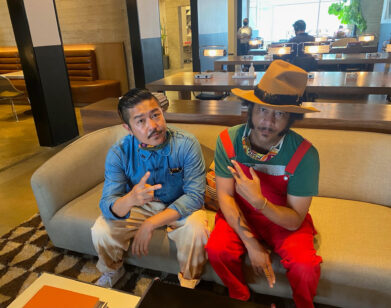SEARCH HISTORY
Working Class History Is Ready for a Hot Labor Summer
This is SEARCH HISTORY, your deep dive into the online habits of our favorite creatures of the internet. From preferred stalking platforms and private browsing habits to the social accounts we should all know about, we slide into the DMs and ask all your burning questions.
From Beyonce’s quit your job anthem to the rise of workers’ unions at the world’s largest coffee chain, labor activism looks like this summer’s hottest trend. But the fight for workers’ rights is as old as capitalism itself. Enter Working Class History, an international group of historians that have been sifting through dusty archives since 2014 in an attempt to preserve the legacy of working class uprisings. Along with posting daily throwbacks to strikes and protests on Facebook, Instagram, and Twitter, the group also hosts a podcast with subjects ranging from stripper unions to the Portuguese revolution. To find out more about Working Class History’s online rebellion, we slid into the DMs of John Lasdun, a key contributor to the project, who enlightened us about their research process, TikTok leanings, and why he’d choose money over clout.
———
ELLA MARTIN-GACHOT: A/S/L?
JOHN LASDUN: A: 8. S: there are people of various gender identities who have contributed to WCH over the years. L: people from all over the world have contributed to the project, but most of the core team is based in the U.S. or the U.K.
MARTIN-GACHOT: What’s the origin story for Working Class History?
LASDUN: We were a group of people who were unhappy with the world as it is—having to work all the time, often at meaningless jobs, just to make profit to enrich a small few. We thought that posting about the anniversaries [of uprisings] on this day in history might be something which would go viral, and help inspire people to get active and organize, so we started posting every day on Facebook. And we’ve grown from there.
MARTIN-GACHOT: When you say “working class,” who are you referring to?
LASDUN: Under capitalism, the working class is a class of people who have been dispossessed of independent means of survival. People were forced off common land through violence, primarily by enclosures in Western Europe, and colonialism in the rest of the world. This left the vast majority of us with no ability to feed, house and support ourselves independently, and with no option but to sell our ability to work to people who do own land, factories, businesses, etc. Our existence seems natural today, you grow up, and you get a job to pay for stuff. But this is not a natural state of affairs. It’s a relatively new development in human society, and it was imposed through tremendous violence.
MARTIN-GACHOT: Fill in the blank – On this day in working class history, _____________
LASDUN: Today, August 9th, in 1914, huge protests took place in Glasgow, Scotland against the declaration of World War I. In 1956, 20,000 women in South Africa marched against apartheid pass laws and kickstarted a mass wave of civil disobedience. In 1970 in London, 150 people, including the British Black Panthers, marched against police raids of the Mangrove Caribbean restaurant in London (featured in the recent 2020 Steve McQueen film, Mangrove). In 1979, women workers in the US-backed dictatorship of South Korea occupied a political party headquarters in protest at job losses and were violently evicted by police. And in 2014, Michael Brown, an unarmed Black teenager, was killed by a white police officer in Ferguson, Missouri, sparking mass protests across the US. These are just a few of the many events on this day we are aware of!
MARTIN-GACHOT: What were your last three Google searches?
LASDUN: Howard Zinn, Tipperary Soviet, and Montevideo 1931 Gatti anarchist prison escape.

MARTIN-GACHOT: What’s your favorite YouTube rabbit hole?
LASDUN: Probably old news clips of British fascist aristocrat Oswald Mosley getting turned over whenever he tried to march anywhere.
MARTIN-GACHOT: What does your TikTok For You page look like?
LASDUN: Damn that is a personal question! Our FYP is mostly a combination of historians, museums, various lefty, trans, and Indigenous creators, cats, and weird old clips from British comedy shows from the ’80s and ’90s. And you can’t get away from the bloody Ryanair account.
MARTIN-GACHOT: How many hours of research do you put into each post?
LASDUN: It totally depends. It might only take a few minutes to get the bare bones of the facts of an event, but then might take a lot longer to understand the historical context it took place in. For example, one of our recent Google searches was about a 1931 escape of anarchist prisoners who dug a tunnel out of a prison in Montevideo [Uruguay]. We had read about an escape of political prisoners from the same prison in 1971. They also dug a small tunnel to get out, and while they were digging, they actually came across the old tunnel from the ’30s, which was way bigger than the one they had managed to dig, and had proper air vents and everything. I think it’s an incredible story, but we needed lots of help from people on Twitter to get hold of various books and translate sections of them so we could get the whole history.
MARTIN-GACHOT: Research finding that shook you the most?
LASDUN: That’s a hard one, not a lot shocks me anymore. But reading about the Holocaust, and how after the concentration camps were “liberated” by the allies, some LGBT+ prisoners had to serve out their sentences afterwards, was pretty shocking. But really it shouldn’t be, as homosexuality and some behaviors seen as gender non-conforming, were still seen as crimes in the allied countries.
MARTIN-GACHOT: Best working class anthem to play while scrolling?
LASDUN: Dolly Parton – “9 to 5.”
MARTIN-GACHOT: Favorite meme format?
LASDUN: Venn diagrams. I was a maths nerd as a kid, so I like how much information you can get across with just a simple image.
MARTIN-GACHOT: Choose one: money or clout.
LASDUN: Money. We get no kind of organizational funding, we are only funded by our readers and listeners, and so with more money we could do a lot more!
MARTIN-GACHOT: What’s a website everyone should know about?
LASDUN: Lots of people know about this website already, but we feel we should give a shout out to archive.org. It’s an amazing resource, and it’s under threat right now from the publishing industry.
MARTIN-GACHOT: Is there a pop icon who’s making working class history work today?
LASDUN: Boots Riley is probably the first person who comes to mind. From political hip-hop, he has developed into filmmaking, and Sorry To Bother You is a great piece of cinema, not just in terms of centering working class life and experiences (particularly, of Black working class people), but in terms of looking at what we can do to make things better.
MARTIN-GACHOT: Have you ever had to turn off comments for a post?
LASDUN: No, but we do have to block a lot of Nazis, racists, transphobes and other bigots on quite a regular basis. Particularly on posts about trans people’s history, which seem to act as a lightning rod for bigotry from people on the far right, and shamefully some who claim to be on the left.
MARTIN-GACHOT: Have you ever regretted or redacted a post?
LASDUN: We have certainly edited posts when corrected by users. For example, wherever possible we try to use appropriate language to describe groups of people. But unfortunately, colonialist terminology is everywhere, and so sometimes we have inadvertently used colonialist terms. The other day we had a post about Native American history which referred to Ottawa people, not realizing this was a colonial term for Odawa people, so we corrected that when followers pointed it out.
MARTIN-GACHOT: If you could spend the day with one person from working class history, who would it be?
LASDUN: I would spend the day with someone who was most unknown, like Leah Feldman. She was a Polish-Jewish woman born at the end of the 19th century, who moved to East London and worked in sweatshops, then took part in the Russian revolution, joined the Insurrectionary Army of Ukraine, later supported Spanish Republicans in the Spanish civil war and the German resistance against Nazism, smuggled weapons to the anti-Franco resistance in Spain in the 1960s, and kept up her activism until her death at age 93.
MARTIN-GACHOT: Labor activism accounts everyone should follow?
LASDUN: @stripperstrikenoho, @zinneducationproject, @perfectunion, @blackwomenradicals, @domestic_work_history, @sexworkhistory.








